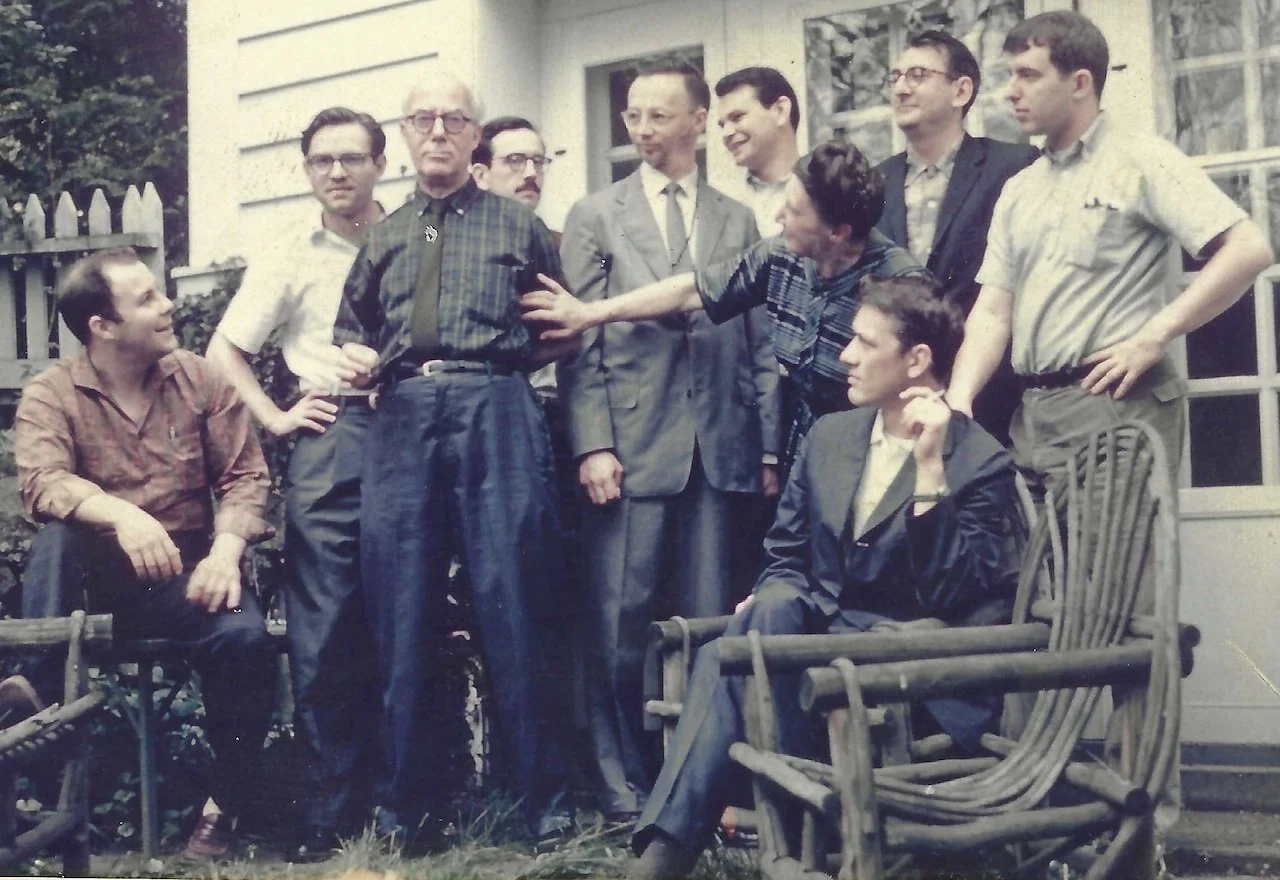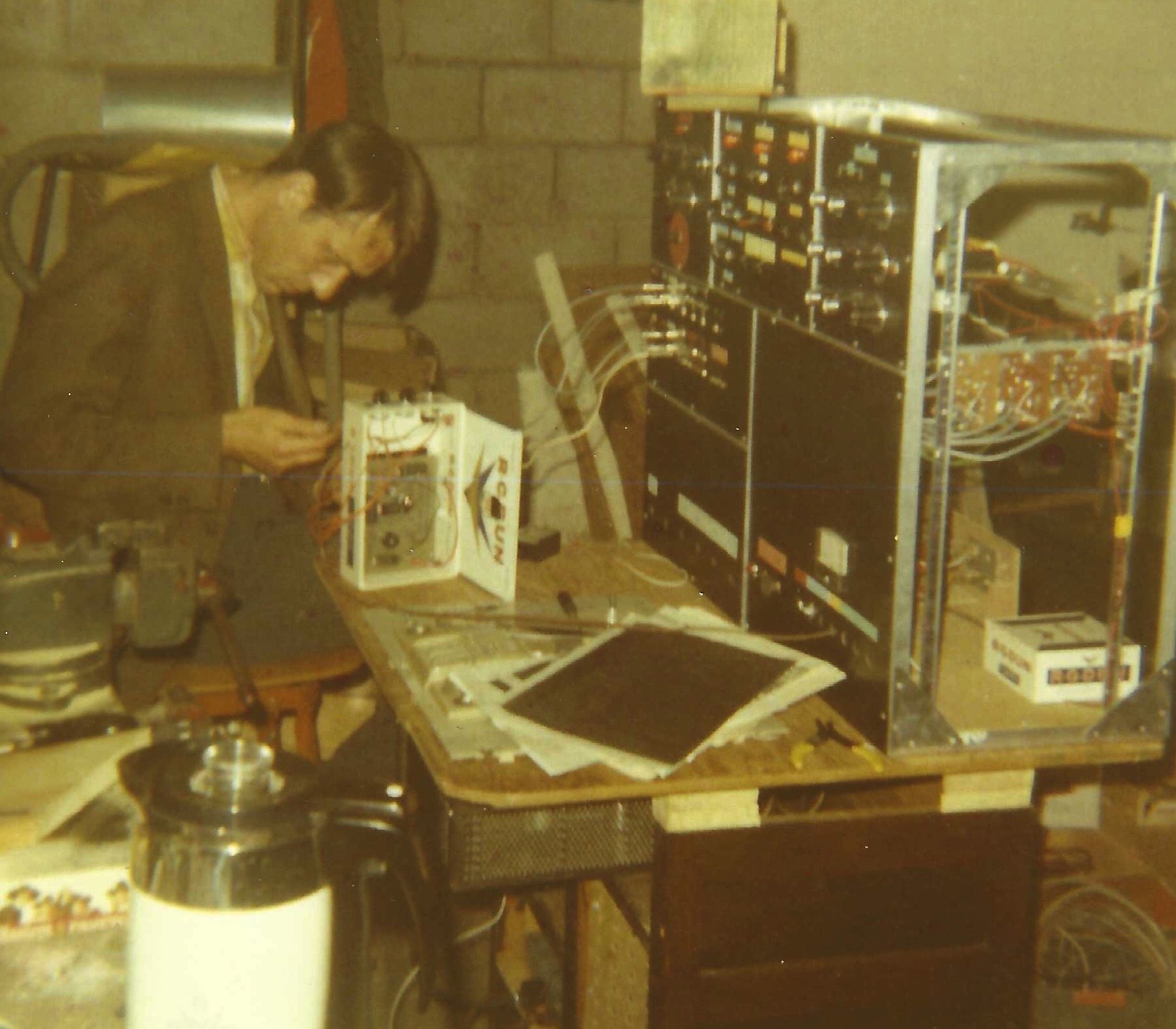Born in Massillon, Ohio on June 21, 1936 to John and Gladys Bates, David and his brothers John and Dan grew up working at the family printing business, building electric trains and model airplanes, and wiring doorbells. At the age of nine David began playing the trumpet, and during his years at Washington High School, music became his focus. Go Tigers!
From the Washington High School yearbook, 1954
Attending the University of Michigan in 1954, David earned his Bachelor of Music in Music Education and Trumpet performance in 1958, and a Master of Music in Composition in 1960. Throughout his years at Michigan, he studied with trumpeter Clifford Lillya and composers Ross Lee Finney, Leslie Bassett, Roberto Gerhard, George Crumb, and George Balch Wilson. In 1959, he began a teaching fellowship in Composition at Michigan, and his compositions Sonata for Solo Violin and Fantasy for Violin and Piano garnered First Prize in the BMI Young Composers' Awards.
University of Michigan composers circa 1960 from left to right: Ed Coleman, Gerald Hummel, Roberto Gerhard, Robert Ashley, Leslie Bassett, Sherman Van Solkema, Poldi Gerhard, David S. Bates (seated), George Cacciopo, Roger Reynolds
Following two years in the U.S. Army (1960-1962), David returned to Ann Arbor and began work on his Doctorate in Musical Composition, serving again as a teaching fellow in composition. From 1963-1966 he held the position of Instructor of Music Theory at the University of Kansas, followed by Composer-in-Residence for the San Antonio, Texas, and Jefferson County, Denver, Colorado school systems through the Contemporary Music Project sponsored by the Ford Foundation. This period of composition yielded choral and band pieces tailored to student performance, of which his work Anthem was awarded the John Reed Memorial Award in 1970.
In 1970, again at the University of Michigan, David became Assistant Conductor for the Contemporary Directions Ensemble, funded jointly by the Rockefeller Foundation and the University of Michigan School of Music for the purpose of performing new music. During this time, David composed SST - Piece in the Electronic Medium and, with colleague Terrance Kincaid, founded KB Electronic Music Instrumentation, creators of the Wavemakers synthesizer.
In the fall of 1971, David accepted the positions of Assistant Professor of Composition and Theory and Director of the Electronic Music Studio at California State University, Fresno, joining his Michigan colleague Jack Fortner. Though he struggled to find the time, David continued to compose new works, reworked a previous piece, 1966’s Piano Sonata in order to better reflect the skills of pianist Ena Bronstein, and finished his largest work Fantasy in Two Parts for Piano and Orchestra. This served as his doctoral dissertation, and in December 1972 David was awarded the Doctor of Musical Arts degree in Composition from the University of Michigan.
In 1975, a fund was created by the Fresno Free College Foundation to preserve David’s legacy through the publishing and performance of his music. Through that fund, the Zumwalt Press published Sueña-Gestures and Interludes One for viola and piano written for his wife, violist Susan. Also at this time, the Electronic Music Studio built by David for Fresno State University was named in his honor and a retrospective of his work aired on KPFA in an episode of Charles Amirkhanian’s Ode to Gravity series which included commentary by CSU Fresno Music Department musicologist and Fresno Bee music critic, Allen Skei.
In the summer of 1974, David (and fellow Michigan alum Gerald Plain) received the Prix de Rome (Rome Prize) in Composition and traveled with his wife Susan and young son David Jr. to Italy for what was to be a two-year fellowship at the American Academy in Rome. Just months later, compelled by illness, he returned to Fresno, CA in October 1974 and died on November 6th. In December of that year, the RAI Orchestra of Rome performed Fantasy in Two Parts for Piano and Orchestra, featuring pianist and colleague from California State University, Fresno, Ena Bronstein.
Susan Bates, left, with a RAI orchestra member and Ena Bronstein, piano soloist, rehearsing Fantasy in Two Parts in Rome, Italy, December 1974.

The Contemporary Directions Ensemble at the University of Michigan, at one time led by Dr. Bates, continued performances of his works after his death. A memorial concert was held in March 1975 with performances by William Albright (Till Then), Uri Mayer, and William Bolcom (Sueña). Pianist Donna Coleman performed Till Then on several occasions as well as Fantasy in Two Parts for Piano and Orchestra with the University of Michigan Philharmonia Orchestra in March of 1976. A special performance of the String Quartet occurred in 1977 at the Roehampton Music Festival in association with The Kató Havas Summer School for Strings. SST had several hearings worldwide, as well as performances of Gestures and Interludes II for Violoncello alone by California cellist Irene Sharp. In 1978, through the efforts of George Balch Wilson, Leslie Basset, Jack Fortner, and others, the Fresno Free College Foundation in collaboration with the University of Michigan created the David S. Bates Award, a national competition in support of young composers. The award was given for the years 1978 - 1982 and included six winners: Anne LeBaron, Byron Tate, Timothy Allen Greatbatch, Suzanne Sheppard, John Anthony Lennon, and Jeffrey Wood.








